The North Carolina Clean Energy Technology Center (NCCETC) recently published The State of the Green Mobility Industry in the Southeastern United States, a market study commissioned by the Netherlands Embassy in Washington, D.C. to gain an understanding of the current state of the industry for electric vehicles and charging infrastructure and their related supply chain, as well as biofuels and hydrogen, and to understand market opportunities for Dutch companies.
Electric vehicle adoption across the United States is happening faster than previously forecasted, with annual electric vehicle (EV) sales on track for around 5.6 million units in 2021, up from 2.1m in 2019 according to a report released earlier this month by Bloomberg New Energy Finance. Several automakers have also committed to produce only electric vehicles, including General Motors, which announced that its vehicle lineup would be entirely electric by 2035.
Still, EVs are in the early stages of adoption and many states have enacted policies and incentives to mitigate the relatively higher up-front costs of electric vehicles and expand the charging infrastructure needed to support them in order to accelerate the adoption and deployment of electric vehicles. Recently, the US Senate passed an infrastructure bill containing approximately $12 billion in support for electric vehicles, including $7.5b for a nationwide charging network.
With the focus on green mobility, including electric and alternative fuel vehicles, growing nationwide, it is expected that green mobility opportunities will also increase in the US Southeast. However, the outlook for these opportunities varies significantly by state and technology depending on adoption rate, state policies and utility efforts, and existing manufacturing facilities and infrastructure.
The Embassy of the Netherlands commissioned the report to be a resource for Dutch companies interested in exploring opportunities in sustainable mobility in the Southeast US. For the purposes of the report, green mobility is defined to include the following: electric vehicles, batteries, smart charging, charging infrastructure, hydrogen and synthetic fuels.
The State of the Green Mobility Industry in the Southeastern United States also provides an overview of recent developments in federal and state policy, utility programs, and brief descriptions of stakeholders in each state, including private businesses, convening non-profits and industry groups, and relevant research centers. The report covered the following states: Alabama, Arkansas, Florida, Georgia, Louisiana, Mississippi, North Carolina, South Carolina, and Tennessee.
NCCETC staff from both the Policy & Markets program as well as the Clean Transportation program wrote the report and consulted with several of the US Department of Energy’s Clean Cities Coalitions across the southeastern United States, including the Alabama Clean Fuels Coalition, Centralina Clean Fuels Coalition, East Tennessee Clean Fuels Coalition, Louisiana Clean Fuels, Middle-West Tennessee Clean Fuels Coalition, and Palmetto Clean Fuels Coalition.
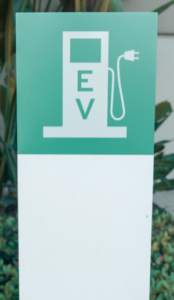 Florida, Georgia, North Carolina and South Carolina have become leaders in the deployment of EV charging infrastructure in the Southeast. Furthermore, Tennessee is showing great strength for fast charging deployment specifically, with the Department of Environment and Conservation working in partnership with the Tennessee Valley Authority to develop a statewide EV fast charging network.
Florida, Georgia, North Carolina and South Carolina have become leaders in the deployment of EV charging infrastructure in the Southeast. Furthermore, Tennessee is showing great strength for fast charging deployment specifically, with the Department of Environment and Conservation working in partnership with the Tennessee Valley Authority to develop a statewide EV fast charging network.
The electric vehicle, battery and EV infrastructure manufacturing industries are closely related, with several states having different opportunities across the green mobility landscape in the Southeast. South Carolina and Tennessee lead the region in vehicle manufacturing, while Georgia leads in battery manufacturing and North Carolina has a strong electronics industry supporting electric vehicle supply equipment.
“Legal and regulatory barriers can affect the pace and location of EV technology deployment, while clear policy goals can both provide market certainty and accelerate deployment,” said Autumn Proudlove, a contributing author on the report and NCCETC’s Senior Policy Program Director.
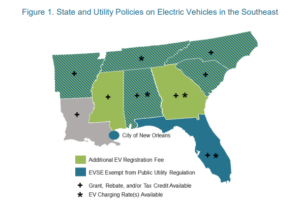 The Policy & Markets team at NCCETC maintains the Database of State Incentives for Renewables & Efficiency (DSIRE), a comprehensive online database of federal, state and utility policies and incentives for renewable energy and energy efficiency. Earlier this year, DSIRE announced the addition of incentive programs for electric vehicles and charging infrastructure to the database.
The Policy & Markets team at NCCETC maintains the Database of State Incentives for Renewables & Efficiency (DSIRE), a comprehensive online database of federal, state and utility policies and incentives for renewable energy and energy efficiency. Earlier this year, DSIRE announced the addition of incentive programs for electric vehicles and charging infrastructure to the database.
“Electric utilities are also taking a leadership role in advancing transportation electrification in several Southeast states through direct infrastructure deployment, incentive programs, and special rate offerings,” added Proudlove. Customers in states such as Mississippi, Georgia, Louisiana and South Carolina can benefit from rebates for residential and commercial Level 2 charging stations that serve these customers’ private needs.
In August 2021, a new executive order set ambitious targets to make half of all new vehicles sold in the US in 2030 zero-emissions vehicles (ZEVs), heightening attention from federal and state governments to accelerate the deployment of EVs and charging infrastructure to support transportation electrification. These federal policies will continue to drive demand higher across the nation, resulting in an increase in EV manufacturing in the automobile industry in the southeastern US.
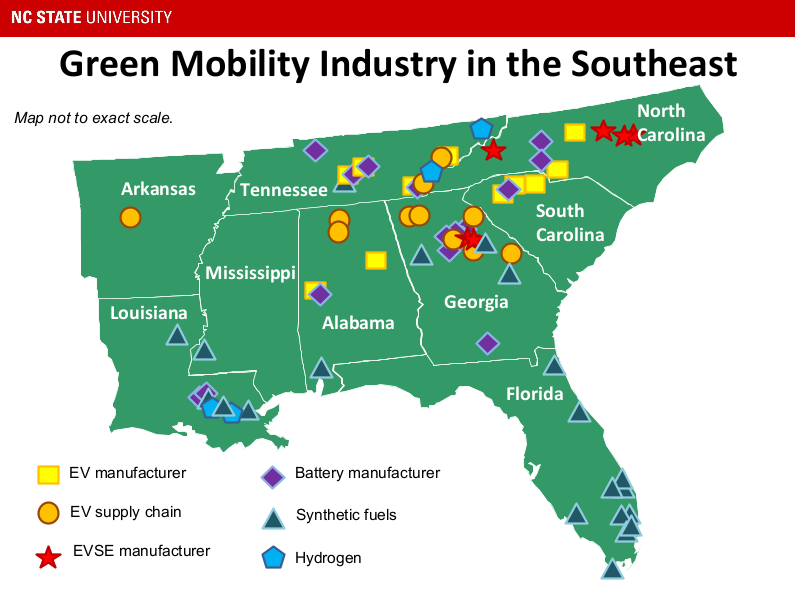 For interested Dutch investors, the southeastern states with the greatest opportunity depend on which aspects of the green mobility industry best fit the interests of Dutch companies, according to the report. One of the largest cross-cutting trends for the region is the importance of the automotive industry. “Most of the states in the Southeast are home to either vehicle assembly plants or automotive supply chain manufacturers,” said Heather Brutz, one of the report’s authors and Finance & Operations Manager for NCCETC’s Clean Transportation program.
For interested Dutch investors, the southeastern states with the greatest opportunity depend on which aspects of the green mobility industry best fit the interests of Dutch companies, according to the report. One of the largest cross-cutting trends for the region is the importance of the automotive industry. “Most of the states in the Southeast are home to either vehicle assembly plants or automotive supply chain manufacturers,” said Heather Brutz, one of the report’s authors and Finance & Operations Manager for NCCETC’s Clean Transportation program.
Additionally, several Southeast states like Tennessee, Georgia and South Carolina had a higher prevalence of manufacturing specifically related to battery electric or fuel cell vehicles. Biodiesel and ethanol production has lost popularity, but there are still users and producers of those fuels in the Southeast.
Renewable diesel, on the other hand, is gaining popularity in the US. Due to the refining process for renewable diesel, regions with existing refineries are more likely to have the needed infrastructure and skilled workforce needed for renewable diesel refineries. “This benefits the Gulf Coast states that already have existing refinery industries, especially Louisiana,” noted Brutz.
In the findings of the market study, North Carolina, South Carolina, Georgia and Tennessee presented some of the greatest manufacturing opportunities for electric vehicle, battery, and charging infrastructure manufacturing. Hydrogen production also shows potential in the Southeast, with Louisiana leading in hydrogen production.
The region’s existing manufacturing infrastructure, combined with federal, state, and utility policies and plans to expand green mobility, offer an opportunity to capitalize on the growing electric and alternative fuel vehicle markets. Several of the Southeast states present significant opportunities in different elements of green mobility, from EV charging infrastructure manufacturing and deployment to production of alternative fuels such as synthetic fuels and hydrogen.
ABOUT THE NC CLEAN ENERGY TECHNOLOGY CENTER
The NC Clean Energy Technology Center is a UNC System-chartered Public Service Center administered by the College of Engineering at North Carolina State University. Its mission is to advance a sustainable energy economy by educating, demonstrating and providing support for clean energy technologies, practices, and policies. The Center provides service to the businesses and citizens of North Carolina and beyond relating to the development and adoption of clean energy technologies. Through its programs and activities, the Center envisions and seeks to promote the development and use of clean energy in ways that stimulate a sustainable economy while reducing dependence on foreign sources of energy and mitigating the environmental impacts of fossil fuel use.
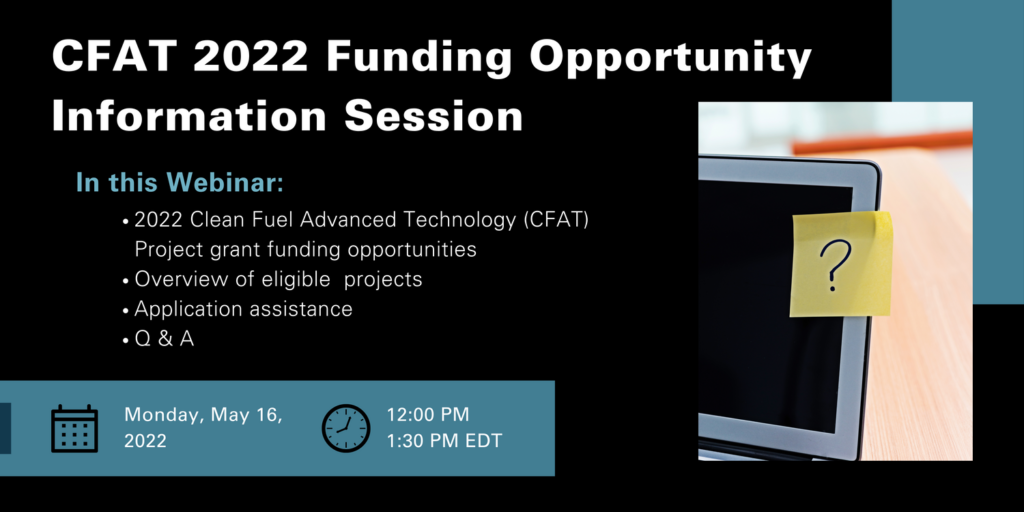 NCCETC will host a CFAT 2022 Informational Webinar from 12:00 p.m. to 1:30 p.m. Monday, May 16, 2022. The free webinar will present an overview of eligible projects and have Q&A to assist with application submission. Learn more and register for the webinar here.
NCCETC will host a CFAT 2022 Informational Webinar from 12:00 p.m. to 1:30 p.m. Monday, May 16, 2022. The free webinar will present an overview of eligible projects and have Q&A to assist with application submission. Learn more and register for the webinar here.

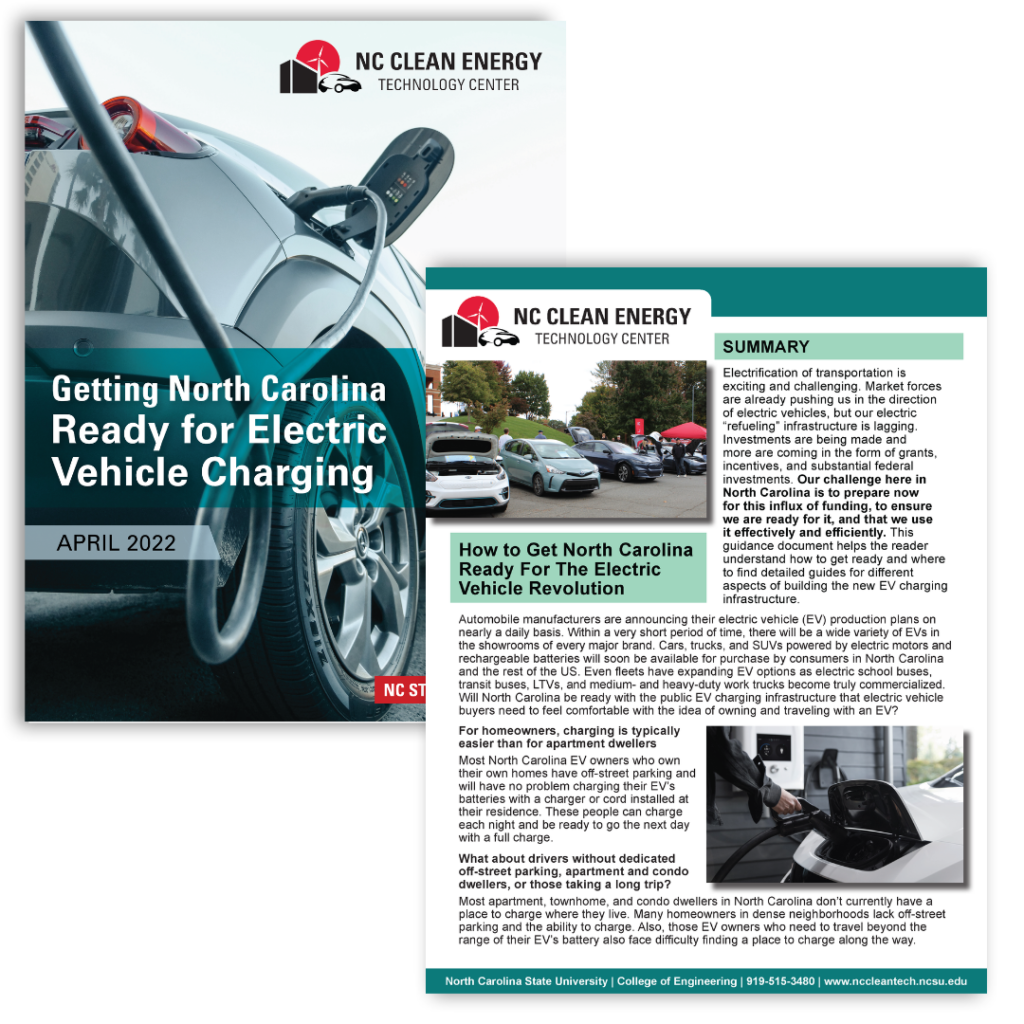 Electrification of transportation is exciting and challenging. Market forces are already pushing us in the direction of electric vehicles (EV), but our electric “refueling” infrastructure is lagging. Public and private investments are being made and more are coming in the form of grants, incentives, and substantial federal investments. In North Carolina alone, VW Settlement funds will bring ~$10 million this year. And the Bipartisan Infrastructure Law (BIL) National EV infrastructure program (NEVI) will invest more than $109 million each year over the next five years in North Carolina.
Electrification of transportation is exciting and challenging. Market forces are already pushing us in the direction of electric vehicles (EV), but our electric “refueling” infrastructure is lagging. Public and private investments are being made and more are coming in the form of grants, incentives, and substantial federal investments. In North Carolina alone, VW Settlement funds will bring ~$10 million this year. And the Bipartisan Infrastructure Law (BIL) National EV infrastructure program (NEVI) will invest more than $109 million each year over the next five years in North Carolina. 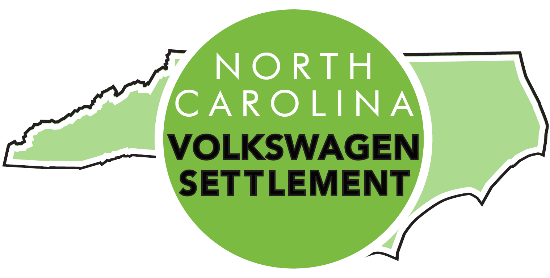
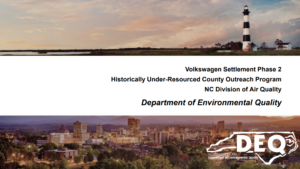 Alrik Lunsford, Heather Brutz, and John Bonitz, with NCCETC’S
Alrik Lunsford, Heather Brutz, and John Bonitz, with NCCETC’S 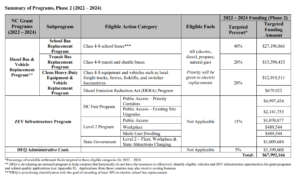
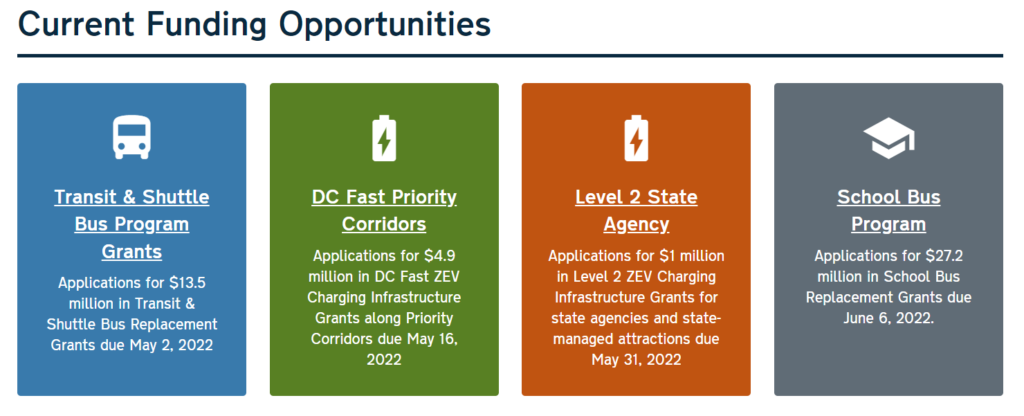

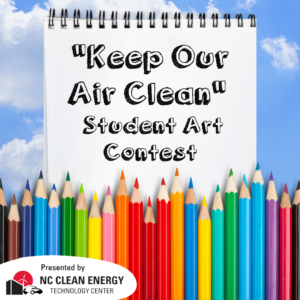

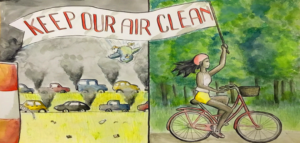
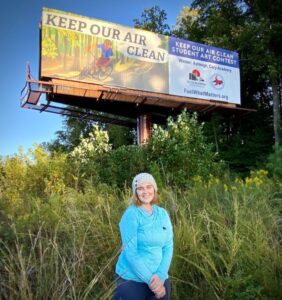
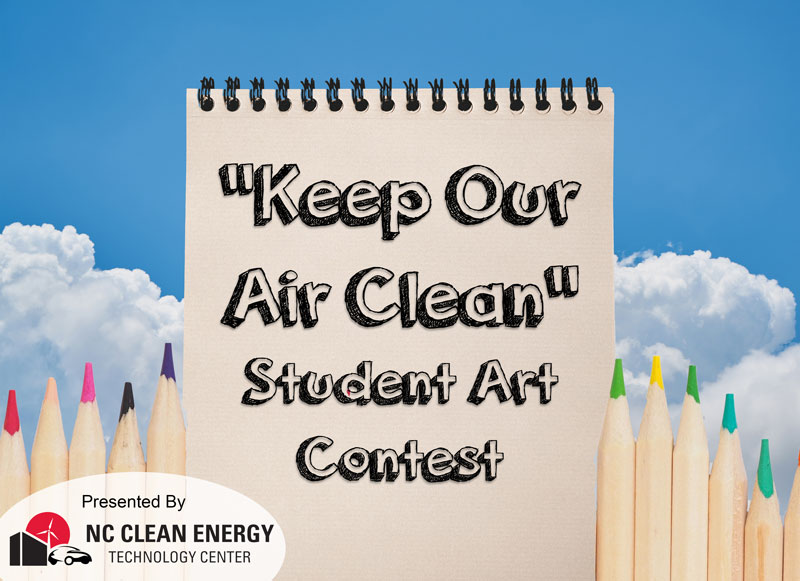
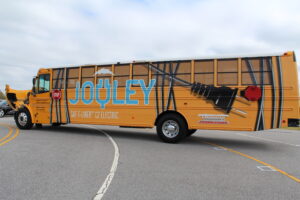 The
The 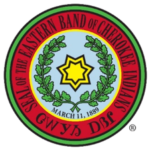
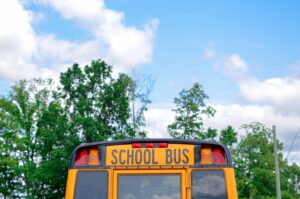 The Eastern Band of Cherokee Indians have a long tradition of stewardship and the
The Eastern Band of Cherokee Indians have a long tradition of stewardship and the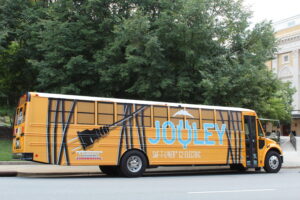 “Diesel school buses drive through every neighborhood, every week, to transport Cherokee Central School students,” Bonitz said. The four all-electric Saf-T-Liner C2 Jouley buses funded by the grant have zero tailpipe emissions, and emissions reduced through the retirement of diesel buses in the EBCI communities will especially improve local air quality on neighborhood streets, heavily trafficked roads, and on school campuses.
“Diesel school buses drive through every neighborhood, every week, to transport Cherokee Central School students,” Bonitz said. The four all-electric Saf-T-Liner C2 Jouley buses funded by the grant have zero tailpipe emissions, and emissions reduced through the retirement of diesel buses in the EBCI communities will especially improve local air quality on neighborhood streets, heavily trafficked roads, and on school campuses.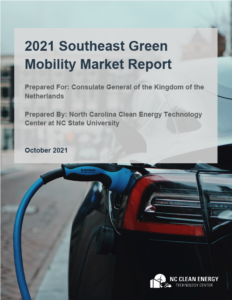 The State of the Green Mobility Industry in the Southeast: Market Trends and Policies Driving Transportation Electrification
The State of the Green Mobility Industry in the Southeast: Market Trends and Policies Driving Transportation Electrification Florida, Georgia, North Carolina and South Carolina have become leaders in the deployment of EV charging infrastructure in the Southeast. Furthermore, Tennessee is showing great strength for fast charging deployment specifically, with the Department of Environment and Conservation working in partnership with the Tennessee Valley Authority to develop a statewide EV fast charging network.
Florida, Georgia, North Carolina and South Carolina have become leaders in the deployment of EV charging infrastructure in the Southeast. Furthermore, Tennessee is showing great strength for fast charging deployment specifically, with the Department of Environment and Conservation working in partnership with the Tennessee Valley Authority to develop a statewide EV fast charging network. The Policy & Markets team at NCCETC maintains the
The Policy & Markets team at NCCETC maintains the  For interested Dutch investors, the southeastern states with the greatest opportunity depend on which aspects of the green mobility industry best fit the interests of Dutch companies, according to the report. One of the largest cross-cutting trends for the region is the importance of the automotive industry. “Most of the states in the Southeast are home to either vehicle assembly plants or automotive supply chain manufacturers,” said Heather Brutz, one of the report’s authors and Finance & Operations Manager for NCCETC’s Clean Transportation program.
For interested Dutch investors, the southeastern states with the greatest opportunity depend on which aspects of the green mobility industry best fit the interests of Dutch companies, according to the report. One of the largest cross-cutting trends for the region is the importance of the automotive industry. “Most of the states in the Southeast are home to either vehicle assembly plants or automotive supply chain manufacturers,” said Heather Brutz, one of the report’s authors and Finance & Operations Manager for NCCETC’s Clean Transportation program.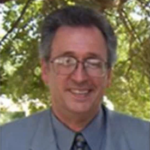 Attendees of the webinar heard from a panel of experts including David Dunn, Division Manager of the Fleet & Facilities management Division for the City of Orlando, Florida. Dunn emphasized the critical roles public fleets have in leading the EV revolution and being the agent of change, from installation and maintenance of infrastructure to creating solutions for grid vulnerability.
Attendees of the webinar heard from a panel of experts including David Dunn, Division Manager of the Fleet & Facilities management Division for the City of Orlando, Florida. Dunn emphasized the critical roles public fleets have in leading the EV revolution and being the agent of change, from installation and maintenance of infrastructure to creating solutions for grid vulnerability.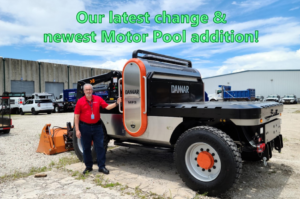 “This [MPS] is a charger, this is a generator, this is a work platform, this is a power station,” Dunn explained. “This is one way to attack the grid vulnerability issue, because you can charge several vehicles off of this one if you need to.”
“This [MPS] is a charger, this is a generator, this is a work platform, this is a power station,” Dunn explained. “This is one way to attack the grid vulnerability issue, because you can charge several vehicles off of this one if you need to.”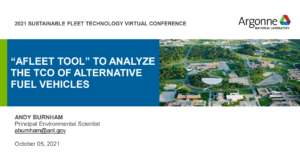 One of the speakers from this webinar was Andrew Burnham from the Argonne National Laboratory which supports the U.S. Department of Energy’s Clean Cities Program. Argonne has developed the Alternative Fuel Life-Cycle Environmental and Economic Transportation (AFLEET) tool. The AFLEET spreadsheet was designed to examine light and heavy duty vehicles for metrics like petroleum use, greenhouse gas emissions and more to find the total cost of ownership.
One of the speakers from this webinar was Andrew Burnham from the Argonne National Laboratory which supports the U.S. Department of Energy’s Clean Cities Program. Argonne has developed the Alternative Fuel Life-Cycle Environmental and Economic Transportation (AFLEET) tool. The AFLEET spreadsheet was designed to examine light and heavy duty vehicles for metrics like petroleum use, greenhouse gas emissions and more to find the total cost of ownership.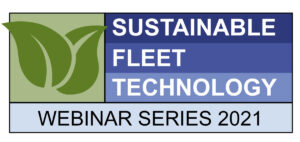 Currently, the clean transportation team is hosting weekly webinars through the
Currently, the clean transportation team is hosting weekly webinars through the